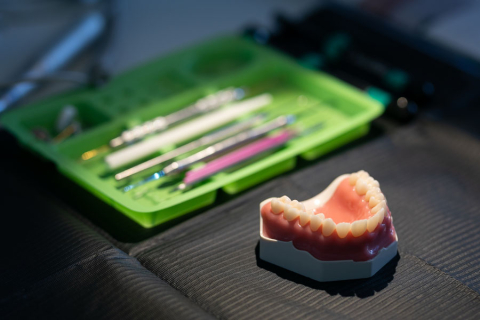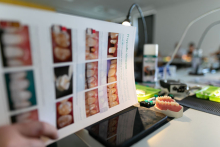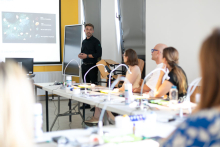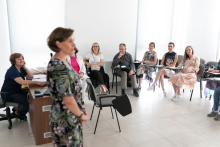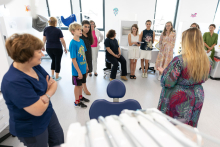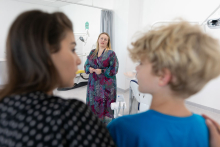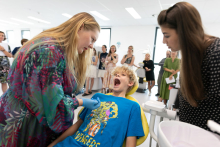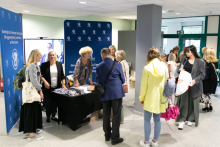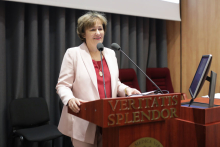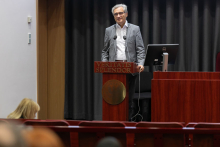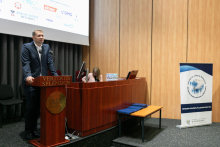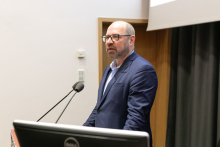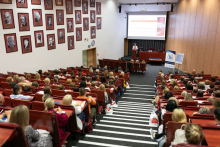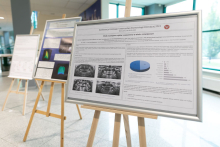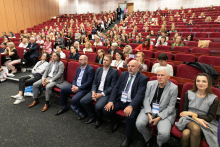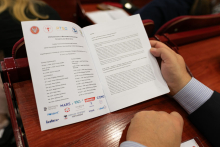The conference was opened by professor Dorota Olczak-Kowalczyk, Dean of the Faculty of Medicine and Dentistry at WUM, head of WUM Department of Pediatric Dentistry and chairperson of the Polish Society of Pediatric Dentistry. The Dean noted the advanced scientific level of the event and the reputable speakers. Guests were also speaking of the role of pediatric dentists and the importance of the conference.
Prof. Zbigniew Gaciong, Rector of WUM: – What we know today is that diseases in a number of organs are closely related to what is happening in the oral cavity. And if any issues begin, they do so in children. Hence the enormous importance of pediatric dentistry and of meetings such as this one.
– We have a lot to catch up with in the field of dentistry – said Michał Dzięgielewski, Director of the Treatment Department at the Ministry of Health – We have to focus on education and prevention. Let’s try to build the system in which you operate exactly where you should be, so that you can offer primary care in your respective field. Director Dzięgielewski added that the change has to start with the youngest population, including schools and preschools.
Early childhood caries
– This lecture was an idea of young doctors who reminded me of the need to recapitulate certain things and to finally get rid of any doubt as to what we should and should not be doing about early childhood caries – said prof. Dorota Olczak-Kowalczyk at the start of her opening lecture at the conference.
Poland is among the countries with the highest frequency and intensity of early childhood caries, causing a lot of complications. Early childhood caries means any carious lesion occurring in a child younger than 3 years of age. The speaker emphasized that in this age group, tissues are immature, prone to disease and to quick advancement of caries, while the range of procedures available for a dentist is limited, requiring a lot of effort. This is not just about the medical aspects, such as the size of the lesion, but mainly about collaboration with the patient and their caregivers. Prof. Olczak-Kowalczyk: – Parents are having higher expectations from dentists, not just in terms of their child’s health but also their appearance, wanting the teeth to look nice. And this, as we know, is practically impossible to accomplish in the event of severe early childhood caries. And it has to be stated loud and clear.
In the opinion of prof. Olczak-Kowalczyk, the most important thing is to explain to the parents that a newly erupted tooth remains immature for 2-4 years, it will be infected with the disease very easily and the disease advances quickly. This is what makes proper prevention so important. According to all the available research, the most successful prevention methods include limiting the amount of sugar in the child’s diet, the right oral hygiene, and the use of fluoride. – Any other methods are just an addition, and there is nothing to replace the above – said prof. Olczak-Kowalczyk.
How to talk to a child patient and their carer at the dentist
A doctor’s work consists of daily conversations with patients and their caregivers. A child is a particularly demanding patient and the doctor offering them treatment should not only be professional but also competent enough to accomplish the expected outcome and minimize the unnecessary stress for all those involved. Therefore, a workshop was held at the event about successful communication at the dentist. It was delivered as a simulation, with the participation of simulated patients and their caregivers. – At this workshop, we were practicing our conversation skills, focusing on difficult situations that involve strong emotions for a child or caregiver, or unrealistic expectations. Our simulated teenage patients and their caregivers were great in their roles, and the workshop participants showed a lot of commitment - says Antonina Doroszewska, PhD, from the WUM Medical Communication College, one of the trainers at the workshop. The workshop participants had a lot of questions to which doctor Doroszewska and prof. Dorota Olczak-Kowalczyk as the other teacher tried to answer.
Other speeches
Many experts, those from WUM included, delivered their speeches and presentations at the conference. Our school was represented by: Ewa Czochrowska, PhD hab., who spoke about the role of an orthodontist in treatment of development age patients with tooth injuries, and prof. Paweł Plakwicz, who presented a lecture on “Use of autotransplantation in treatment of children with tooth injuries.” The agenda further included presentations by experts from the Arctic University of Norway, University of Amsterdam, the Medical University of Łódź, and the Children’s Memorial Health Institute. There were workshops on composite restorations in the frontal section and on the use of the “SureSmile” aligner system in treatment of children and adults.
